ACL IP Fragments Matching - NCS55xx and NCS5xx
Introduction
In the previous TechNote, we covered the matching criteria on the basis of Packet Length. In this note, we will discuss how customers can protect the data-plane from Fragmented Packets. On many occasions,fragmented packets are not expected in the network. It becomes very important for network administrators to add that extra layer of filtering. Hardware should be capable of filtering incoming packets on the basis of fragment flags and offset values. In this document, we will explore yet another filtering capability of NCS55xx and NCS5xx.
Fragmentation
Let us have a quick refresher, before jumping into the implementation. In simple words, IP fragmentation can be considered a process of breaking down large packets into smaller fragments. This happens when intermediate devices has lower MTU on the interface than the arriving packet.
The packet is reassembled later with various fields of the IP packet.
IP Header
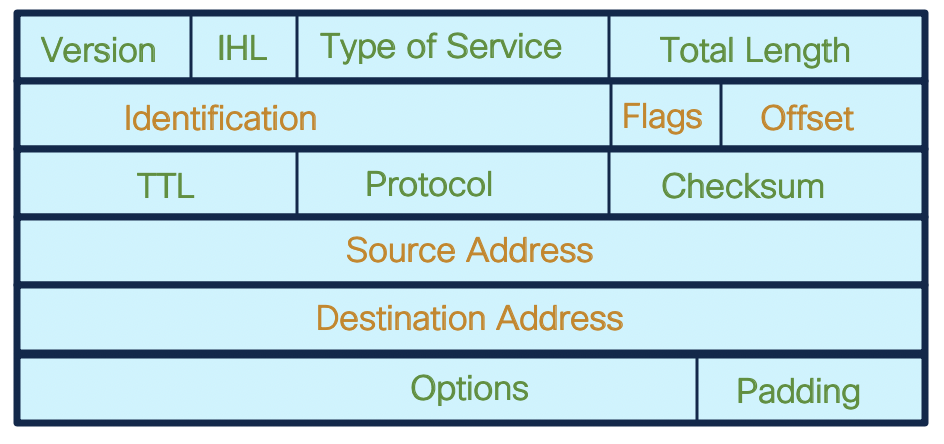
Below are the important fields during fragmentation and reassembling of the original packet.
- Identification
- Flags
- Offset
- Source and Destination Addresses
Let us take a simple example.

In the above figure, all the links are default size of 1500 bytes, except the link connected between R1 and H1. We have configured it as 1000 bytes. When a packet of 1500 byte arrives on the interface, R1 has to fragment the packet. The packet will be fragmented as below

For more information on IP fragmentation please Refer
IPv4 Packet Types w.r.t Fragmentation
IPv4 Packets fall into the below category.
| Packet Type | More Fragment | Fragment Offset | L4 Header |
|---|---|---|---|
| Non Fragmented | 0 | 0 | Yes |
| Initial Fragment | 1 | 0 | Yes |
| Non-Initial Fragment | 1 | Non-Zero | No |
| Non-Initial Fragment | 0 | Non-Zero | No |
As per the following Documentation, non-fragments and the initial fragment of an IP packet can contain both Layer 3 and 4 information that the ACLs can match against, for a permit or deny decision. Non-initial fragments are typically allowed through the ACL, because they can be blocked based only Layer 3 information in the packets. However, because these packets do not contain Layer 4 information, they do not match the Layer 4 information in the ACL entry, if it exists. Allowing the non-initial fragments of an IP datagram through is acceptable because the host receiving the fragments is not able to reassemble the original IP datagram without receiving all the fragments. These initial or non-initial fragments, may always not be, legitimate packets.
Understanding the keyword: Fragments
From the above discussion, let us see the use of the keyword Fragments and how it works on NCS55xx and NCS5xx.
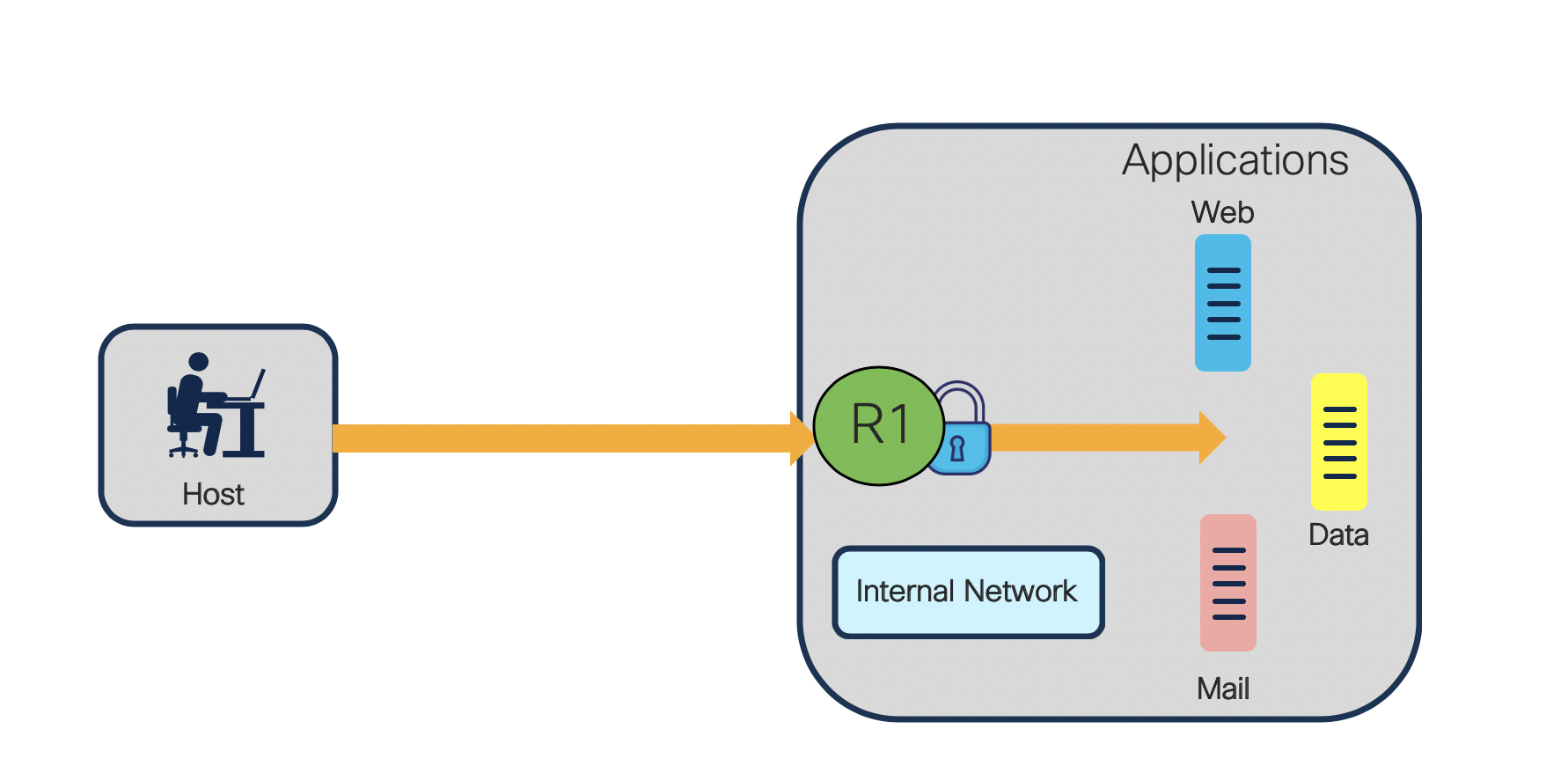
Consider the above scenario. A host wants to access a web server inside the network. The network administrator configures an access list which should allow all non fragmented packets from any user to that server on port number 80. This access-list allows any user to the destination with tcp port 80 and denies all other services.
RP/0/RP0/CPU0:N55-24#show access-lists ipv4 fragment
ipv4 access-list fragment
10 permit tcp any host 70.1.1.2 eq www
20 deny ipv4 any any
RP/0/RP0/CPU0:N55-24#
ACL Verification
RP/0/RP0/CPU0:N55-24#show access-lists ipv4 usage pfilter location 0/0/CPU0
Thu Aug 6 17:27:24.056 UTC
Interface : TenGigE0/0/0/0.10
Input ACL : Common-ACL : N/A ACL : fragment
Output ACL : N/A
RP/0/RP0/CPU0:N55-24#show access-lists ipv4 fragment hardware ingress verify location 0/0/CPU0
Thu Aug 6 17:27:47.309 UTC
Verifying TCAM entries for fragment
Please wait...
INTF NPU lookup ACL # intf Total compression Total result failed(Entry) TCAM entries
type ID shared ACES prefix-type Entries ACE SEQ # verified
---------- --- ------- --- ------ ------ ----------- ------- ------ ------------- ------------
TenGigE0_0_0_0.10 (ifhandle: 0x41b8)
0 IPV4 1 1 2 NONE 4 passed 4
RP/0/RP0/CPU0:N55-24#
Note: The fragment keyword is available in the default key and this can be applied to all the systems including Q-MX,Jericho,Jericho+ with and without external TCAM.
Traffic Tests and Validation
First we send non fragmented packets with TCP destination port 80. ACE 10 is matching the packets allowing the access to the web server.

RP/0/RP0/CPU0:N55-24#show access-lists ipv4 fragment hardware ingress location 0/0/CPU0
Fri Aug 7 05:35:14.811 UTC
ipv4 access-list fragment
10 permit tcp any host 70.1.1.2 eq www (70495 matches)
20 deny ipv4 any any
Now let us modify the packet and make it a fragmented packet and check if the ACL allows or denies the traffic

RP/0/RP0/CPU0:N55-24#show access-lists ipv4 fragment hardware ingress location 0/0/CPU0
Fri Aug 7 05:39:50.345 UTC
ipv4 access-list fragment
10 permit tcp any host 70.1.1.2 eq www (1863448 matches)
20 deny ipv4 any any
From the above, we could see the that Fragmented packets are also making their way through the network, which is against what the network administrator had intented. It permits these packets because non-initial fragments do not contain Layer 4 information, and the ACL logic assumes that if the Layer 3 information matches, then the Layer 4 information would also match, if it was available. This could lead to data plane security issues.
Now how to stop this ? Lets see the use of the keyword Fragments and how we can use the same to drop the fragmented packets and allow only non-fragmented traffic.
Modifying the ACL as below
RP/0/RP0/CPU0:N55-24#show access-lists ipv4 fragment
Fri Aug 7 07:07:09.803 UTC
ipv4 access-list fragment
10 deny ipv4 any host 70.1.1.2 fragments
20 permit tcp any host 70.1.1.2 eq www
30 deny ipv4 any any
RP/0/RP0/CPU0:N55-24#
Sending non fragmented packets with TCP destination port 80
We can see from the below output that ACE 20 is matching and traffic is allowed.
RP/0/RP0/CPU0:N55-24#show access-lists ipv4 fragment hardware ingress location 0/0/CPU0
Fri Aug 7 07:12:37.129 UTC
ipv4 access-list fragment
10 deny ipv4 any host 70.1.1.2 fragments
20 permit tcp any host 70.1.1.2 eq www (20260 matches)
30 deny ipv4 any any
RP/0/RP0/CPU0:N55-24#
Sending fragmented packets: Non-initial Fragment with Offset > 0
We can see the packets are matching the ACE 10 now and traffic is denied
RP/0/RP0/CPU0:N55-24#show access-lists ipv4 fragment hardware ingress location 0/0/CPU0
ipv4 access-list fragment
10 deny ipv4 any host 70.1.1.2 fragments (40966 matches)
20 permit tcp any host 70.1.1.2 eq www
30 deny ipv4 any any
RP/0/RP0/CPU0:N55-24#
We can use the below command, to check the node counters to see the reason behind the packet drops. Here we can see the counter is getting increased due to deny ACL
RP/0/RP0/CPU0:N55-24#show spp node-counters location 0/0/CPU0 | in ACL
PUNT ACL_DENY: 220484
RP/0/RP0/CPU0:N55-24#
Limitation with Keyword: Fragments
In the above section, we saw how a fragmented packet with a non zero offset value is filtered out. The limitation of the keyword Fragments is, it can be used only for offset values greater than 0. If we want to filter out the initial fragments (FO=0), we will not be able to do by this keyword. For example consider the below packet
It has More Fragment = 1 and Fragment Offset = 0. Therefore this is the initial fragment.
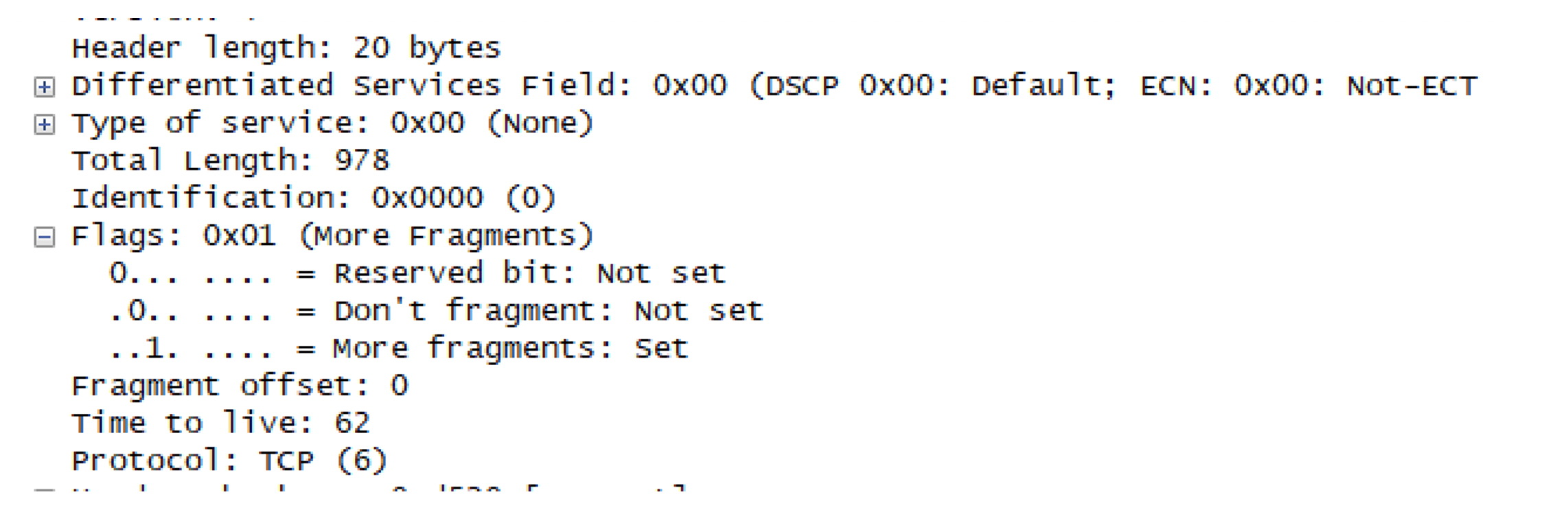
RP/0/RP0/CPU0:N55-24#show access-list ipv4 fragment hardware ingress location 0/0/CPU0
Fri Aug 7 08:08:07.663 UTC
ipv4 access-list fragment
10 deny ipv4 any host 70.1.1.2 fragments
20 permit tcp any host 70.1.1.2 eq www (264506 matches)
30 deny ipv4 any any
We can see it matches the ACE 20 and traffic is allowed, though it is a fragmented packet. To avoid this scenario, we need to use another keyword Fragment-Type.
Understanding the keyword: Fragment-Type
Let us try to understand the keyword Fragment-Type in more details and the way we can use it to overcome the limitation of the keyword Fragments.
Fragment-Types
Below are the options available for matching the fragments
| Fragment Type | Description | Flags |
|---|---|---|
| dont-fragment | Match don’t fragment flag | DF=1 |
| first-fragment | Match first fragment flag | MF=1 & FO=0 |
| is-fragment | Match is fragment flag | Any fragments. |
| last-fragment | Match last fragment flag | MF=0 and FO>0 |
Configuring ACL with fragment-type
We will take into consideration packet type which is first-fragment. MF=1 & FO=0 (this is the packet which escaped the keyword - fragments)
RP/0/RP0/CPU0:N55-20#show access-lists ipv4 fragment-type
Fri Aug 7 12:15:36.349 UTC
ipv4 access-list fragment-type
10 deny ipv4 any host 60.1.1.2 fragment-type first-fragment
20 permit tcp any host 60.1.1.2 eq www
30 deny ipv4 any any
Note: Below hw-module profile needs to be configured along with a UDK
hw-module profile tcam format access-list ipv4 src-addr dst-addr src-port dst-port proto frag-bit
hw-module profile tcam acl-prefix percent 20
Applying the ACL to the interface
Before applying the ACL to the interface let us understand
hw-module profile tcam format access-list ipv4 src-addr dst-addr src-port dst-port proto frag-bit
hw-module profile tcam acl-prefix percent 20
Keyword fragment-type is not supported with default TCAM keys. We need to define a UDK with frag-bit. When configuring it to an interface it needs to be applied along with compression level. There are multiple levels of ACL compression supported,however the NCS5xx and NCS55xx only supports certain levels, protocols and directions. Uncompressed or compression level 0 ACLs utilize only one TCAM lookup in hardware. Compressed ACLs utilize two TCAM lookups in hardware : Stage 1: External TCAM & Stage 2: Internal TCAM. Only compress level 3 is supported.
Because compression requires two TCAM lookups, the keyword fragment-type can only be supported on systems with an external TCAM. Compression is only supported for IPv4/IPv6 in the ingress direction.
RP/0/RP0/CPU0:N55-20#show running-config interface gigabitEthernet 0/0/0/2.10
Fri Aug 7 12:27:15.320 UTC
interface GigabitEthernet0/0/0/2.10
ipv4 address 70.1.1.1 255.255.255.0
encapsulation dot1q 10
ipv4 access-group fragment-type ingress compress level 3
!
The above 2 profiles are only applicable for systems having Jericho and Q-MX with NetLogic (NL12k) eTCAM. For systems having Jericho+ and Optimus Prime (OP) eTCAM it works by default due to larger space available. (We will dedicate a separate post for Jericho2 and its properties.)
| Hardware | ASIC | eTCAM |
|---|---|---|
| NCS-5501-SE | Q-MX | NL12k |
| NCS-5502-SE | J | NL12k |
| NCS55A1-36H-SE-S | J+ | OP |
| NC55-24H12F-SE | J | NL12k |
| NC55-24X100G-SE | J | NL12k |
| NC55-36X100G-A (-SE) | J+ | OP |
| NCS55A2-MOD-SE-S | J+ | OP |
To understand in detail regarding the profile and compression support, please refer couple of excellent articles (Hybrid ACL’s, HW-Module Profiles)
ACL Verification

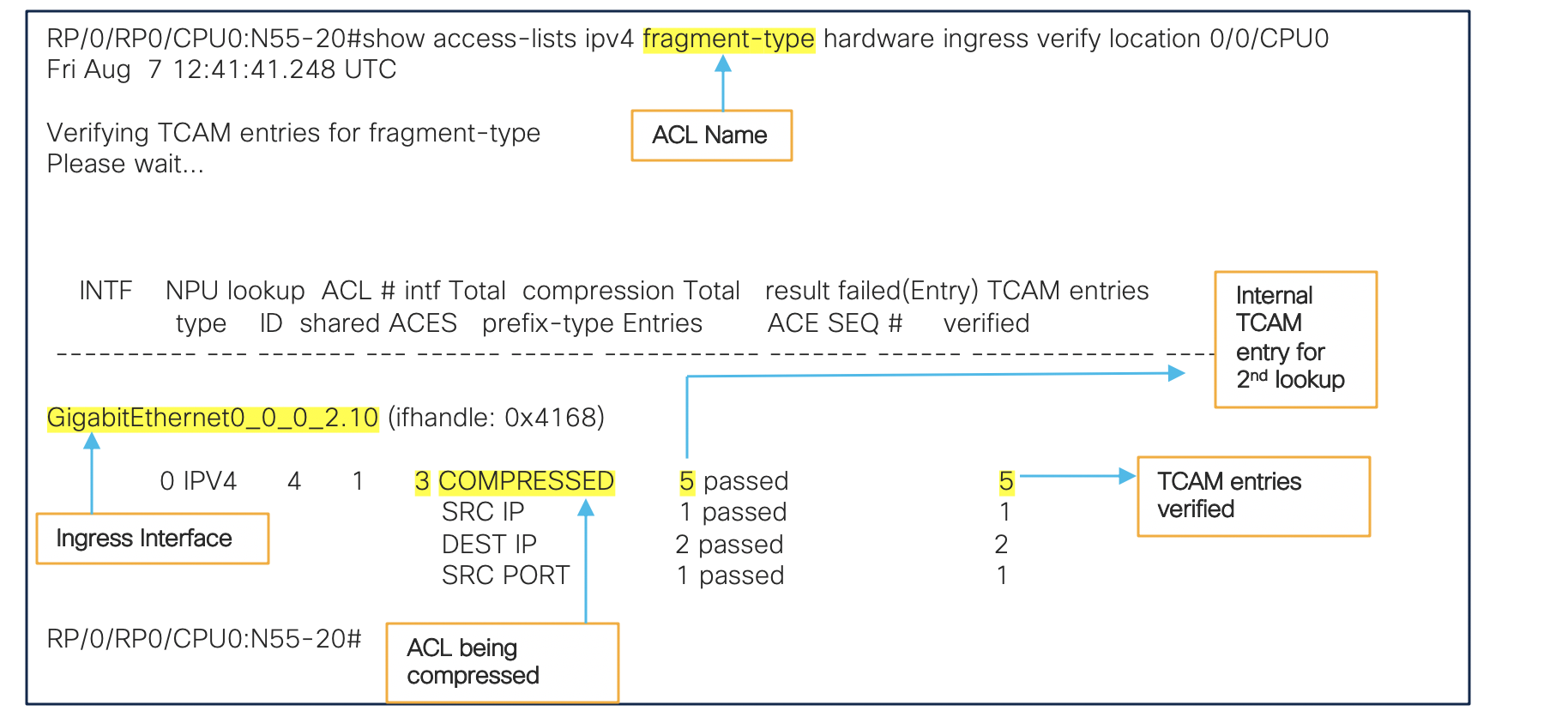
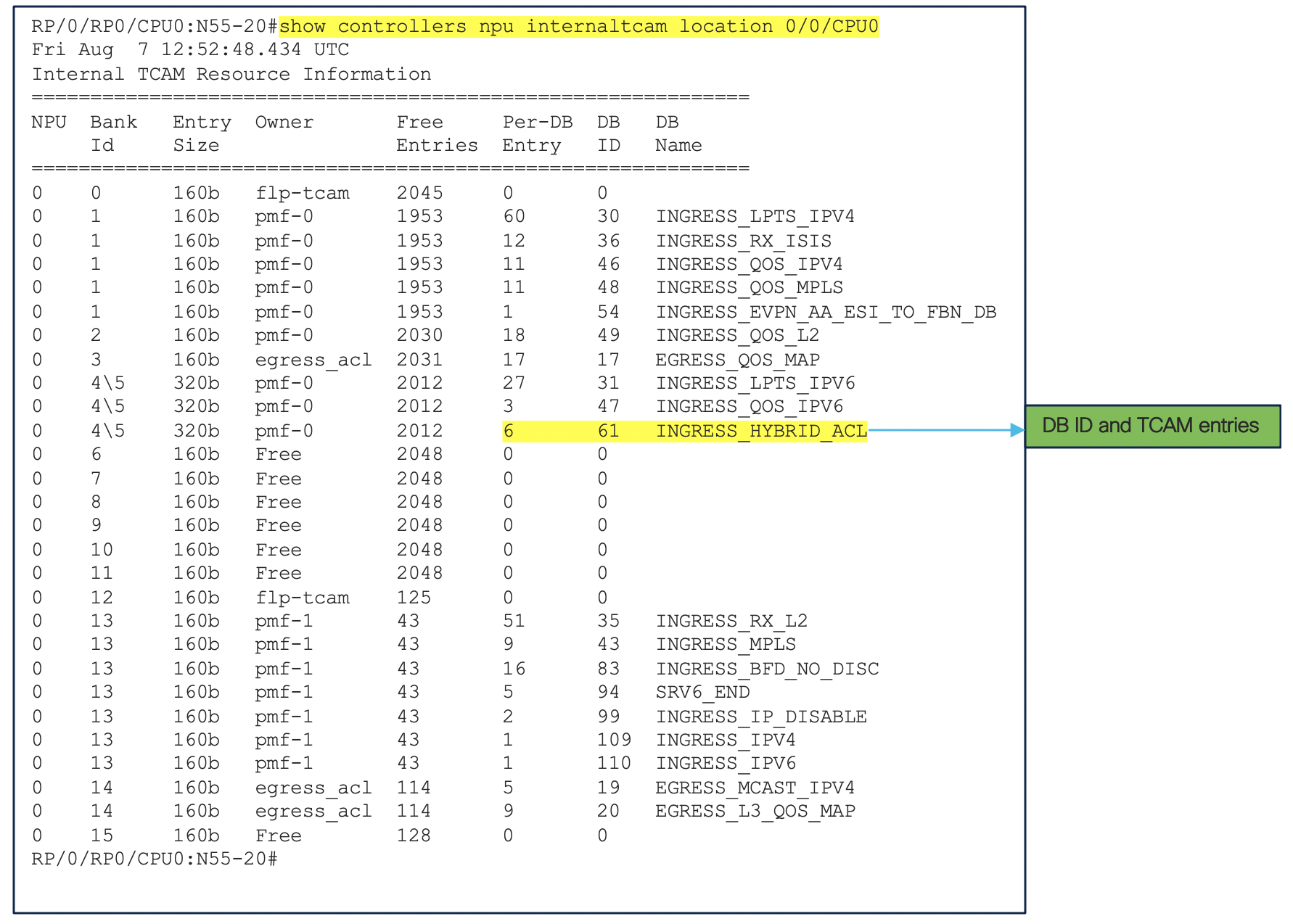
Traffic Tests and Validation
First we send non fragmented packets with TCP destination port 80 and could ACE 20 is matching and traffic is permitted.

RP/0/RP0/CPU0:N55-20#show access-lists ipv4 fragment-type hardware ingress location 0/0/CPU0
Fri Aug 7 15:30:33.954 UTC
ipv4 access-list fragment-type
10 deny ipv4 any host 60.1.1.2 fragment-type first-fragment
20 permit tcp any host 60.1.1.2 eq www (513249 matches)
30 deny ipv4 any any
RP/0/RP0/CPU0:N55-20#
Sending first fragmented packet MF=1 and Offset = 0
Packets are matching the ACE 10 and getting denied
RP/0/RP0/CPU0:N55-20#show access-lists ipv4 fragment-type hardware ingress location 0/0/CPU0
Fri Aug 7 17:28:06.005 UTC
ipv4 access-list fragment-type
10 deny ipv4 any host 60.1.1.2 fragment-type first-fragment (186591 matches)
20 permit tcp any host 60.1.1.2 eq www
30 deny ipv4 any any
RP/0/RP0/CPU0:N55-20#
We can also use is-fragment in place of first-fragment.
RP/0/RP0/CPU0:N55-20#show spp node-counters location 0/0/CPU0 | in ACL
Fri Aug 7 17:32:14.929 UTC
PUNT ACL_DENY: 23004
RP/0/RP0/CPU0:N55-20#show spp node-counters location 0/0/CPU0 | in ACL
Fri Aug 7 17:32:18.124 UTC
PUNT ACL_DENY: 23278
RP/0/RP0/CPU0:N55-20#
Changing the ACE 10 to fragment-type don’t fragment with same packet MF=1 and Offset = 0
RP/0/RP0/CPU0:N55-20#show access-lists ipv4 fragment-type
Fri Aug 7 17:37:43.211 UTC
ipv4 access-list fragment-type
10 deny ipv4 any host 60.1.1.2 fragment-type dont-fragment
20 permit tcp any host 60.1.1.2 eq www
30 deny ipv4 any any
RP/0/RP0/CPU0:N55-20#
RP/0/RP0/CPU0:N55-20#show access-lists ipv4 fragment-type hardware ingress location 0/0/CPU0
Fri Aug 7 17:37:00.856 UTC
ipv4 access-list fragment-type
10 deny ipv4 any host 60.1.1.2 fragment-type dont-fragment
20 permit tcp any host 60.1.1.2 eq www (98063 matches)
30 deny ipv4 any any
RP/0/RP0/CPU0:N55-20#
From the above output we can see, it is not matching sequence 10, hence it moves to the next sequence 20. The fragment matches the criteria, hence it is permitted.
To summarise the behaviour for different fragment types
Considering Packet-Fragment has MF=1 and FO=0
| Fragment Type | Action | Reason |
|---|---|---|
| first-fragment | Dropped | Expects MF=1 FO=0 |
| dont-fragment | Permitted | Expects DF=1 |
| is-fragment | Dropped | Matches Any fragments |
| last-fragment | Permitted | Expects MF=0 FO>0 |
You can use the available options for fragment-type, to filter the fragments as per different scenarios. Fragment-type keyword gives user granular level of filtering the packets.
References
Summary
Fragmentation is a process of breaking bigger packet into smaller packets and reassembling it. We saw how malicious fragments can make their way in and cause security issues. NCS5xx and NCS55xx is equipped with the capabilities to provide that extra security to the data plane. The platforms support different keywords - Fragments and Fragment-type to filter out fragments which are not expected to enter the network. They can be filtered before reaching the target. Hope this helps to clear the filtering criteria for fragmented packets.
Stay tuned for next article, where we will explore another ACL matching capabilities of the portfolio.
Leave a Comment